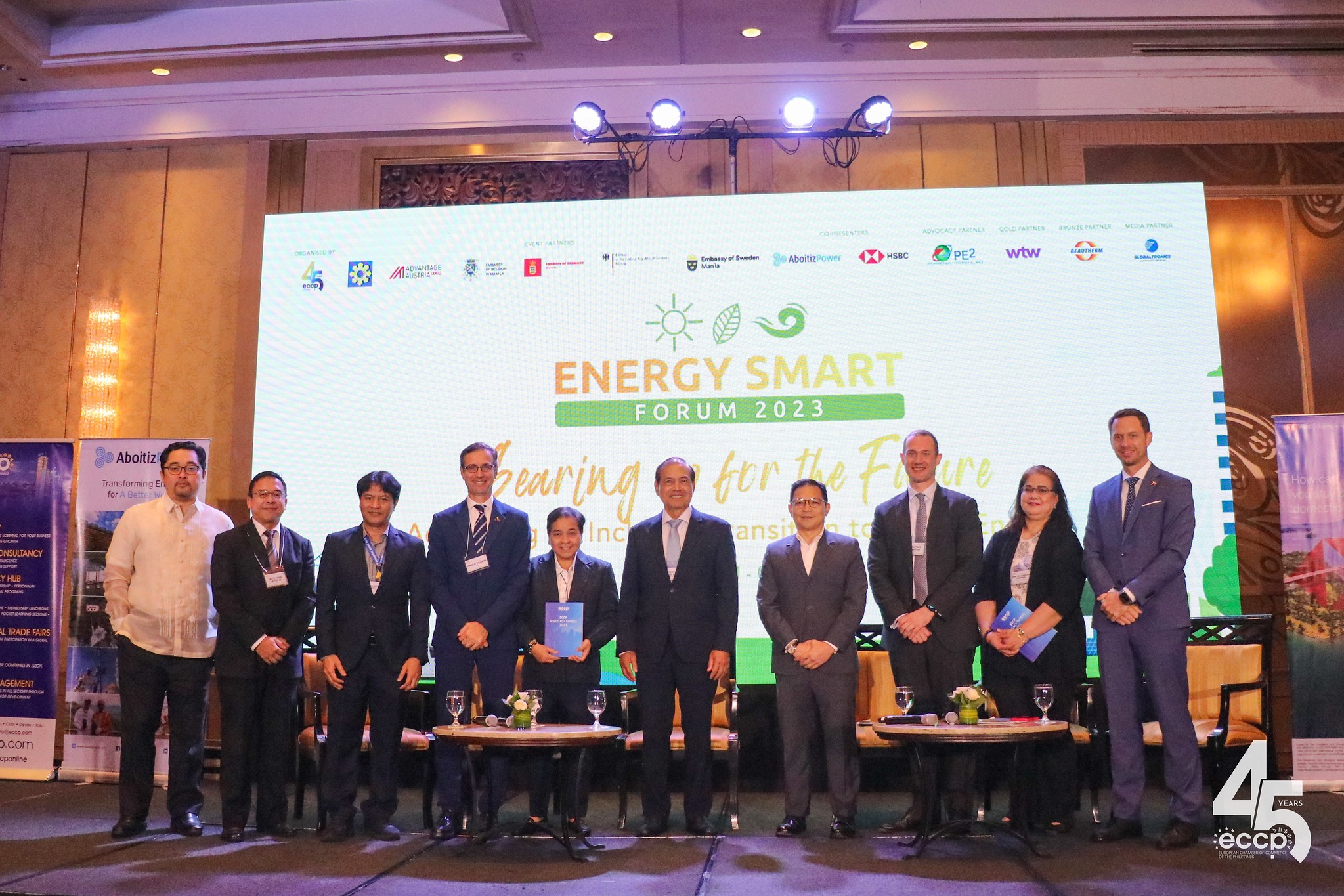
Makati City, Philippines – In alignment with the nation's aspirations for a greener and more resilient energy landscape, the European Chamber of Commerce of the Philippines (ECCP) organized its 2023 Energy Forum to spur discussions and drive collaborative efforts toward a sustainable energy future for the Philippines.
Themed "Gearing up for the Future: Advancing an Inclusive Transition to Clean Energy", the forum brought together key stakeholders, policymakers, industry experts, and thought leaders from the government sector, private sector and academe to explore critical facets of the Philippines' energy transformation.
In his opening remarks, ECCP President Paulo Duarte emphasized the importance of collaborative engagement with all stakeholders to unlock new industries and markets that will contribute to prosperity and progress.
“At ECCP, we commit to provide a platform for productive and insightful discussions on key areas including energy security, to ensure a steady supply of energy and safeguard our country against potential disruptions; clean energy transition, to mitigate the impacts of climate change and create a healthier environment for all; and sustainability, which entails equitable access to energy resources, the creation of green jobs, and the empowerment of communities to participate in and benefit from the energy transition,” said Duarte.
Shaping the Renewable Energy Landscape for the Future
In the first session of the forum, speakers delved into the government initiatives, new investments opportunities, and collaborative endeavors that are steering the country towards an increased reliance on renewable energy (RE) sources.
On behalf of Department of Energy Secretary Raphael Lotilla, DOE Undersecretary Vice Admiral Giovanni Carlo Jamero Bacordo presented his keynote speech, highlighting the Department’s intensified call for use of renewable energy. Bacordo underscored the goal to attain a 35% minimum RE share in the power generation mix by 2030 and 50% by 2040, as stated in the Philippine energy plan and the national renewable plan.
“The DOE is focused on establishing the regulatory framework and designing the renewable energy policy mechanisms to heighten the interest from the private sector, which should ultimately lead to generating more investments,” said Bacordo.
Key strides include the removal of foreign ownership and limitation requirements for RE, and the mandatory renewable portfolio standards which require distribution utilities to contract at least 2.52% of electricity sales from RE until 2040.
In her presentation, DOE Assistant Secretary Mylene Capongcol stated that a total of 1,087 projects were already awarded with RE contracts with a total potential capacity of 113.564 GW. In order to reach their goal, the Department is currently developing the Philippine Energy Transition.
Program with a 4-point strategy to accelerate RE deployment, implement a green and smart transition system, build port infrastructure development for Offshore Wind (OSW) resources, and decommission and/or repurpose coal plants. To Department of Trade and Industry - Board of Investments Executive Director for the Industry Development Group Ma. Corazon Dichosa also showcased key areas for investments, particularly critical mineral needs for energy technologies.
Meanwhile, representing the private sector, Aboitiz Renewables, Inc. President and CEO James Villaroman draws on his company’s best practices, citing “cross-sector collaboration” and “sound policies on investment and incentives” as key factors. “Our vision is not just for ourselves but for the generations that will inherit the results of our efforts. With a balanced approach, working within the realm of realities and challenges, we can usher in a sustainable energy future for the Philippines,” Villaroman said.
HSBC Philippine Director for Multinational and International Subsidiaries Banking Jonathan Webster also echoed the sentiment, stating that financial institutions likewise have strong commitments to Net Zero transitions. In the case of HSBC, delivering a net zero global economy has become an essential pillar of its business strategy.
“We are committed to net zero carbon emissions in our own operations and supply chain by 2030. Our partnership with the Renewable Energy sector is a critical piece to achieving these goals, while opening up a world of opportunity for a sustainable future,” said Webster.
Energy Efficiency and Advancing a Consumer-Centric Approach in the Energy Sector
In terms of breakthroughs that are reshaping energy consumption patterns, experts from the government and non-profit sectors, as well as the academe centered on best energy efficiency (EE) practices.
Philippine Energy Efficiency Alliance President Mr. Alexander Ablaza delved into the topic of ESCOs or Energy Service Companies that offer multi-technology services and goods towards developing and designing EE projects and ensuring cost-effective and optimal performance. According to Ablaza, ESCO’s and financial institutions can cooperate to finance projects for the use of energy consumers.
As for use of Energy Efficiency & Consumption in the industrial and commercial sectors, De La Salle University Associate Professor for Mechanical Engineering Dr. Neil Stephen Lopez cited opportunities such as the electrification of transportation to decarbonize the sector as it can “potentially cut carbon emissions from transport by as much as 50%.”
As for empowering consumers into participating in sustainable energy practices, Philippine Senate Energy Committee Vice Chair Sherwin Gatchalian, Climate Change Commissioner Albert Dela Cruz, Energy Regulatory Commission Chief Energy Regulation Officer - Renewable Energy Division Engr. Jayson Corpuz and Ateneo de Manila University Associate Professor Dr. Majah-Leah Ravago shared messages and strategies to enhance public awareness and engage with the public to actively contribute to a clean energy future, and underscored the importance of developing energy storage systems, improving the energy transmission sector, as well as supply management.
The Energy Smart Forum 2023, a hallmark of the ECCP since 2011, was organized in partnership with Event Partners Department of Energy Philippines, ADVANTAGE AUSTRIA Philippines, Embassy of the Kingdom of Belgium in Manila, Embassy of Denmark in the Philippines, German Embassy Manila, and the Embassy of Sweden in Manila; Co-Presenters Aboitiz Power Corporation and HSBC Philippines; Gold Partner WTW; Advocacy Partner Philippine Energy Efficiency Alliance Inc.; Bronze Partner Beauchem Thermtech Group, Inc. and Media Partner Globaltronics.